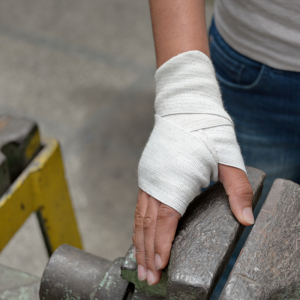What Injuries are Covered under Workers’ Compensation?
 Recovering from a workplace accident can be a particularly trying time in any professional’s life. Different from a regular accident, workplace accidents often involve heavy machinery, may be more serious, and come with a whole slew of legal ramifications. What’s more, as an employee, you must navigate your return to work, which can put strain on an already fractured relationship with your employer. If you or a loved one was harmed in a workplace accident, Munley Law Personal Injury Attorneys expresses its deepest sympathies.
Recovering from a workplace accident can be a particularly trying time in any professional’s life. Different from a regular accident, workplace accidents often involve heavy machinery, may be more serious, and come with a whole slew of legal ramifications. What’s more, as an employee, you must navigate your return to work, which can put strain on an already fractured relationship with your employer. If you or a loved one was harmed in a workplace accident, Munley Law Personal Injury Attorneys expresses its deepest sympathies.
From counseling hundreds of clients successfully through the workers’ compensation process, we can say that the best thing to do in the wake of a workplace accident is to try to remain calm. Focus on your recovery, and all of the other pieces will fall into place. For more information on what to do after an accident, please review our workers’ compensation FAQ page. Consider reaching out to us today for a free consultation on your case.
Over the years, we have noticed that there is a lot of confusion around workers’ compensation laws in the state of Pennsylvania. In this article, we aim to clarify some of the most important parts of the law, and outline how you’ll know whether your injuries or your standing would qualify you to receive workers’ compensation benefits.
What is Workers’ Compensation?
Workers’ compensation laws exist to help protect your financial health and help get you back on your feet while you are recovering from an accident that occurred at work. Workers’ compensation includes a variety of different benefits, ranging from wage protection to medical care and even to vocational rehabilitation. For more information about the suite of workers’ compensation benefits, check out the Pennsylvania Department of Labor and Industry’s workers’ compensation overview.
In summary, though, if you are a resident of Pennsylvania and were injured on the clock, then you likely will be entitled to some support. The Pennsylvania Workers’ Compensation Act extends this coverage to nearly all laborers– including seasonal, part-time, and full-time workers.
If you qualify for workers’ compensation, and your claim is accepted, then you likely will begin receiving your benefits approximately 21 days after you report your injury to your employer. If your injury occurred on or after January 1st 2022, you can expect to be compensated up to $1205.00 per week. Each year, the Pennsylvania Department of Labor and Industry calculates this payout ceiling based on a number of different variables. If your injury occurred before January 1st 2022, your maximum payout will be different. You can find a full list of historical payout ceilings listed on the Pennsylvania Department of Labor and Industry’s website.
While the payout ceiling is constant for everyone, your actual payout will depend on your individual situation. The law recognizes that some injuries are worse than others, so how much your injury limits your ability to work will determine the amount you are compensated. If your injury is completely disabling and makes it impossible for you to work, then you will receive your full payout. It is important to note that if you are claiming disability benefits, your disability status will be reviewed roughly every two years. If your injury only partially prevents you from working, then that will be reflected in your payout.
What Injuries are Covered by Workers’ Compensation?
 Workplace injuries come in many different shapes and sizes. According to the Pennsylvania Department of Labor and Industry, across all industries, the most common type of workplace injury is a sprain or a strain, which accounts for nearly half of all injury reports (Pennsylvania Work Injuries and Illness). The leading cause of sprains and strains in the workplace was found to be overexertion. If you are feeling fatigued while at work, we urge you to take extra caution to protect yourself and those around you.
Workplace injuries come in many different shapes and sizes. According to the Pennsylvania Department of Labor and Industry, across all industries, the most common type of workplace injury is a sprain or a strain, which accounts for nearly half of all injury reports (Pennsylvania Work Injuries and Illness). The leading cause of sprains and strains in the workplace was found to be overexertion. If you are feeling fatigued while at work, we urge you to take extra caution to protect yourself and those around you.
Fortunately, though, workers’ compensation laws do not discriminate based on injury type. In short, any type of injury you sustain while at work would potentially qualify you to receive benefits. Even if you feel your injury is minor, you may still be entitled to receive compensation for it. To make sure that you have the opportunity to file for workers’ compensation, you must report your injury to your supervisor.
Notably, certain illnesses, such as COVID-19 now also qualify under workers’ compensation laws. If you contract such a disease while at work, and as a result are in some way limited in your ability to work, then you will likely qualify to receive workers’ compensation benefits.
What is Specific Loss?
Specific loss laws cover a particular class of injuries that result in permanent loss, disfigurement, or scarring. Some examples of these types of injuries include loss of hearing or vision, or loss of a limb, finger, or extremity, and permanent scarring of the skin caused by burns. Payouts for specific loss are determined by a set schedule, which takes into account the nature of the loss. For more information on specific loss, please review this presentation created by the Pennsylvania Department of Industry and Labor.
What If a Workers’ Compensation Injury Results in Death?
If a workplace injury results in death, the deceased’s family will likely be entitled to compensation. Death benefits include compensation for loss of life, as well as compensation for funeral and burial expenses.
Are there injuries that are not covered by workers’ compensation?
Unfortunately, not all injuries are covered by workers’ compensation laws. See below for an inclusive list of exclusions from workers’ compensation laws.
- Injuries caused by self-harm. If your injury is deemed to be caused by an act of self harm you will not qualify for workers’ compensation benefits.
- Injuries caused by an intra-personal altercation. If things get heated with a supervisor, fellow employee, or even a third party, and escalate, any injuries you sustain from the altercation will not be covered under workers’ compensation laws.
- Injuries sustained while under the influence of drugs or alcohol. Even if you are within the legal limit of intoxication, this could still be used against you in a court of law.
- Injuries sustained while commuting to work. Although all injuries that you incur at work will be covered under workers’ compensation laws, injuries you sustain commuting to or from work will not be covered under workers’ compensation laws.
How Can Munley Law Personal Injury Attorneys Help?
 Hiring an experienced workers’ compensation lawyer can not only make the claims process go much more smoothly, but can also help you get the full compensation that you deserve. Many claims are denied simply because employers hope to intimidate employees out of filing for the benefits that they are entitled to. With our track record of multi-million dollar settlements, and over 60 years of experience, our team is the best in the business. Many of our team members have been locally and nationally recognized. Our dedicated staff will work with you every step of the way, from filing your claim to litigating in court. Our goal is to get you back on your feet and make sure you get the support you are entitled to as a Pennsylvania resident and taxpayer. Please do not hesitate to reach out to us today for your free consultation.
Hiring an experienced workers’ compensation lawyer can not only make the claims process go much more smoothly, but can also help you get the full compensation that you deserve. Many claims are denied simply because employers hope to intimidate employees out of filing for the benefits that they are entitled to. With our track record of multi-million dollar settlements, and over 60 years of experience, our team is the best in the business. Many of our team members have been locally and nationally recognized. Our dedicated staff will work with you every step of the way, from filing your claim to litigating in court. Our goal is to get you back on your feet and make sure you get the support you are entitled to as a Pennsylvania resident and taxpayer. Please do not hesitate to reach out to us today for your free consultation.









